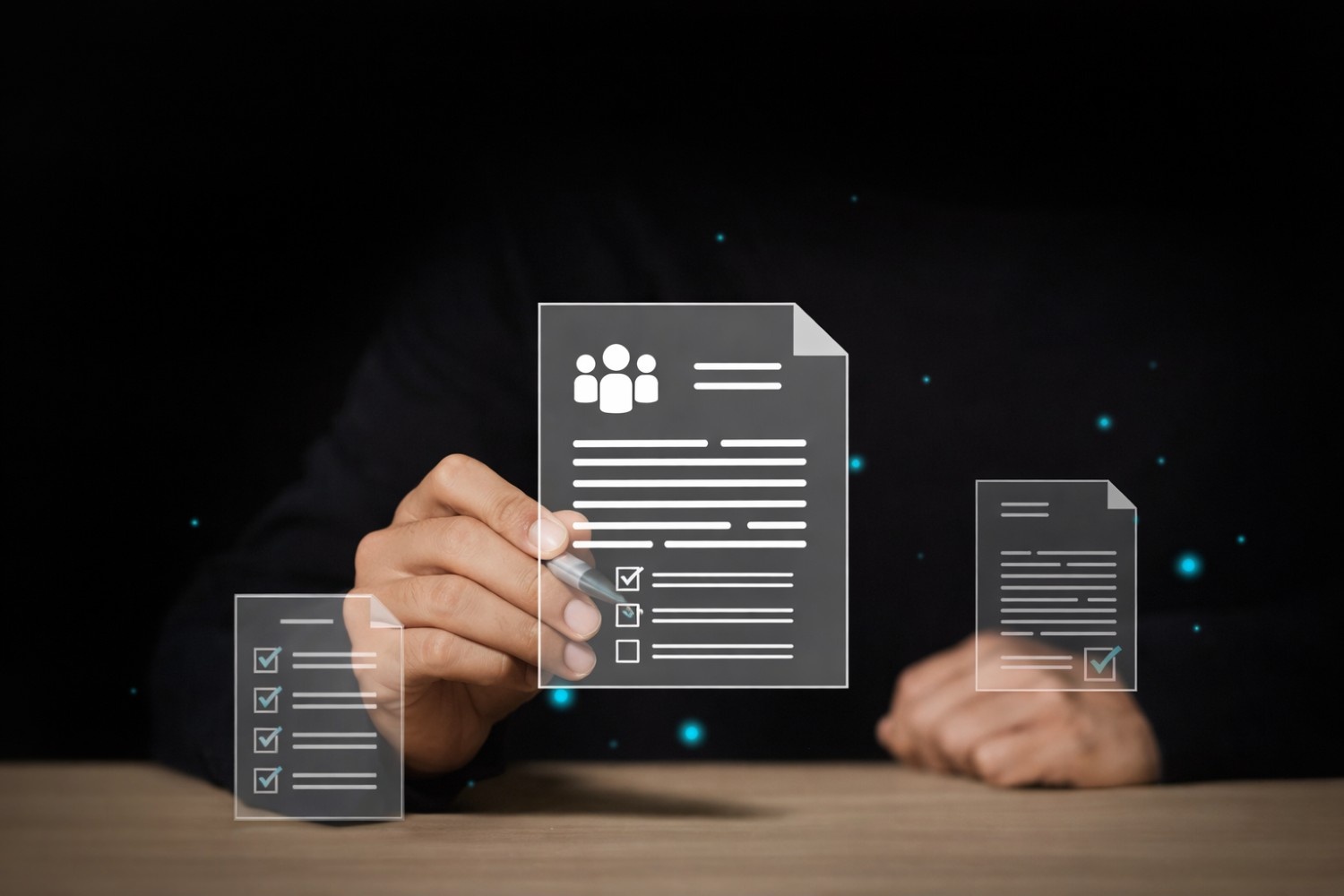Top Benefits of Using AI Recruitment Software in the Hospitality Industry
AI recruitment software helps hire faster, improve frontline staffing, and deliver better outcomes for hotel management hiring. Learn how AI can automate screening, improve candidate matching, reduce drop-offs and help hotels scale hiring across properties with greater efficiency, consistency, and retention.

Namrata Gupta
Senior Sales Manager

AI is reshaping how hotels, resorts, restaurants, cruise lines, and theme parks find and hire talent. For an industry battling sky‑high turnover, seasonal surges, and multi‑property complexity, AI recruiting tools and recruitment management software deliver faster hiring, lower costs, more consistent quality, and better hiring outcomes.
This article talks about the benefits of using AI recruitment software for hotel management hiring, best practices, and a practical rollout plan. Read on for more!
Why Hospitality Hiring Needs AI
People are the product in hospitality. The warmth at check‑in, the precision behind the pass, the speed of housekeeping turns, the care in guest recovery, etc., decide how people perceive your business. However, the realities of the industry, like high application volumes, multilingual workforces, scattered locations, and the need for round-the-clock coverage, are difficult for traditional recruitment models to handle.
By automating tedious tasks, improving matches, forecasting retention, and maintaining candidate engagement, AI assists recruiters in hospitality hiring. AI recruiting tools are being used more and more by hospitality businesses for candidate sourcing, screening, and engagement, with exponential growth expected over the next three years.
8 Benefits of Using AI Recruitment Software in Hotel Management Hiring
1. Accelerated Resume Screening
AI parses resumes in bulk, extracts skills/experience, flags red‑lines (e.g., availability or license gaps), and ranks candidates against job requirements.
In the hospitality industry, a single front‑desk opening can attract hundreds of resumes in days. AI reduces time‑to‑first‑contact to under two hours for hourly roles. This is crucial when top candidates accept offers fast. Enable automated resume screening in your ATS and set clear "knockout" criteria (work authorization, shift flexibility, location) to ensure you only shortlist the best candidates.
2. Enhanced Candidate Matching
AI looks past keywords to provide job fit using signals from experience, certifications, tenure history, and, where applicable, behavioral/assessment data. A concierge fluent in Mandarin may still fail if they have not handled VIP last‑minute changes. In hotel management hiring, matching on situational experience and soft skills improves the quality of hire and tenure.
Pair resume parsing with structured inputs (languages, certifications, commute range) and standardized assessments for FOH roles.
3. Bias Reduction & Fairer Hiring
Although diversity is key to the hospitality industry, particularly in hotel management hiring, early evaluations may be impacted by human bias. Consistent scoring and AI-enabled blinding aid in creating teams that accurately represent your goals for inclusive hiring.
By prioritizing relevant qualifications over demographic proxies, skills-based hiring models and structured screening minimize variability and unconscious bias. Keep a human in the loop for final decisions, monitor adverse impact ratios by role and location, and blind personal identifiers during screening.
4. Predictive Analytics for Retention & Performance
AI and LLM models can examine past hiring and results to determine which candidate profiles are more likely to succeed and stay (e.g., banquet to events, cruise to resort transitions). Predictive signals shift hiring toward stayers and top performers, particularly for high-churn roles in hotel management hiring.
To improve AI recommendations, define outcome labels (90-day retention, guest score proxy) and provide feedback to the AI models.
5. Skill Gap Analysis to Align Hiring & Training
AI identifies gaps in your workforce by comparing it to demand (e.g., plant-based pastry skills, language coverage, barista speed under rush). Since hiring trends change quickly in the hospitality industry, AI-powered proactive gap analysis informs targeted L&D and smarter requisitions in hotel management hiring and workforce planning.
Establish quarterly gap reviews, map essential skills for each property, and label roles as must-have or nice-to-have.
6. Better Candidate Experience
Automated status updates, reminders, and feedback keep applicants informed. In a service industry, the recruitment journey should feel hospitable. Consistent candidate communication boosts the employer brand and increases offer acceptance.
Turn on event‑driven notifications (application received → screening → interview → decision) and offer candidates visibility into next steps. Talentpool offers a dedicated candidate module that not only helps recruiters manage candidates effortlessly but also improves candidate experience with automated reminders, resources, and better communication channels.
Read More: How to Reduce Candidate Drop-Offs Before It's Too Late
7. Cost Efficiency & Smarter Media Spend
Right now, recruiting budgets are tight in every industry. Optimizing for qualified applicants and interview show‑rates cuts waste and lowers cost‑per‑hire. Track cost‑per‑qualified‑apply and interview‑to‑hire by source, shift spend weekly, and cap bids where conversion drops.
8. Scalability for Seasonal Peaks & Global Openings
AI recruitment software allows hospitality companies to quickly expand internationally or during peak seasons.
With Talentpool you are always prepared for the next sudden hiring boom. With AI-driven position sets and intelligent recommendations that maintain a ready pool of competent applicants on hand, the platform assists you in creating role-specific talent pipelines in advance. Therefore, you can scale quickly without sacrificing quality or control when demand rises, whether as a result of the opening of a new resort or the holiday rush.
Using AI Recruitment Software - Risks, Guardrails, and Compliance
- Data Privacy & Lawful Basis: Collect only essential candidate data, explain AI usage clearly, and comply with GDPR, CCPA, and global data laws to build trust and avoid penalties.
- Fairness & Bias Mitigation: Use skills‑based screening, anonymize resumes, and audit algorithms regularly to reduce bias and ensure inclusive, equitable hiring.
- Transparency & Explainability: Inform candidates when AI is used and what factors affect decisions; maintain internal documentation for accountability and clarity.
- Human Oversight & Accountability: Keep recruiters involved, validate AI suggestions, and document decisions to balance automation with human judgment.
- Data Governance & Retention: Store candidate data securely, limit access, and delete records when no longer needed to ensure compliance and minimize risk.
- Security & Access Controls: Apply encryption, role‑based access, MFA, and regular audits to protect personal and operational data in AI‑driven systems.
- Vendor & Contractual Safeguards: Partner with compliant ATS and chatbot vendors; ensure contracts define data use, audit rights, and model update transparency.
- Cross‑Border Transfers & Localization: Use approved transfer mechanisms like SCCs, ensure multilingual parity, and localize privacy notices for each region.
- Monitoring & Continuous Improvement: Track recruitment metrics like time‑to‑hire, review models quarterly, and refine processes through Responsible AI audits.
- Accessibility & Candidate Experience: Ensure chatbots and portals meet accessibility standards (WCAG), offer multilingual options, and maintain human fallback for inclusivity.
Implementation Roadmap for AI Recruiting Tools in Hospitality Hiring
- Diagnose the funnel. Baseline time‑to‑first‑contact, time‑to‑hire, interview‑to‑offer, offer acceptance, early retention (30/90‑day), candidate NPS. Identify 2-3 biggest leaks (e.g., slow scheduling; no‑shows).
- Prioritize pilot roles. Choose high‑volume, repeatable roles (front desk, housekeeping, F&B). Define clear success targets (e.g., 30% faster time‑to‑hire; 20% higher show rates).
- Select & integrate tools. Ensure ATS + chatbot + screening integrates with calendars, messaging apps, and HRIS. Check multi‑property workflows and multilingual support.
- Establish ethics & policy. Draft candidate notices, bias testing cadence, data retention rules, and exception handling; train the team on responsible use.
- Enable hiring managers. Provide interview kits, structured scorecards, and clear "when to override AI" guidelines. Train on prompt discipline and succinct candidate feedback.
- Measure & iterate. Run a 12‑week pilot, review weekly dashboards, and conduct a post‑mortem. Feed outcomes back into models; rebalance ad spend using programmatic controls.
KPI Cheat Sheet for Hotel Management Hiring
- Time‑to‑first‑contact: Target < 2 hours for hourly/frontline roles.
- Time‑to‑hire: Reduce by 30-60% where scheduling was previously the bottleneck.
- Interview‑to‑hire conversion: Track by role/source; aim for steady lift with structured early screens.
- Offer acceptance rate: Improve through faster processes and better role fit.
- Early retention (30/90‑day): Use as a proxy for quality of hire.
- Candidate NPS: Monitor per property and role; close the loop on feedback.
Why Leading Brands Choose Talentpool for Hospitality Hiring
In hospitality, speed, precision, and personalization define the guest experience. Talentpool brings these same qualities to hiring.
Built as an AI-first recruitment management software, Talentpool helps hotels, resorts, restaurants, and hospitality groups hire 3x faster, engage 85% more candidates, and reduce drop-offs by 40%. With AI working at every stage, your HR teams can focus on people and even build a resilient talent pipeline. Schedule a demo to know how we can simplify and streamline your recruitment operations!
Conclusion
AI recruiting is a practical way to stabilize staffing, protect guest experience, and give HR on‑the‑ground superpowers. By combining automation, intelligence, and hospitality‑grade communication, brands can hire faster, reduce waste, and build more diverse, resilient teams.
Tags

Namrata Gupta
Senior Sales Manager
Namrata Gupta is a key member of the Talentpool team, bringing extensive experience in talent acquisition and recruitment technology to help companies build better hiring processes.





